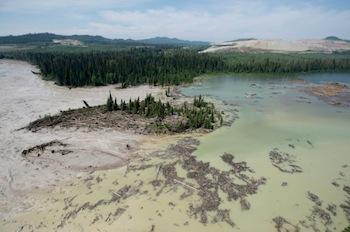Image Caption
Summary
Tsilhqot’in open to talks despite legal action on Mount Polley breach
On Aug. 3, the Tsilhqot’in National Government filed a Notice of Civil Claim in the BC Supreme Court against Imperial Metals, Mount Polley, Knight Piesold, AMEC, and the Province of British Columbia.
The filing occurred almost two years to the day after the Mount Polley Mine tailings storage facility breach on Aug. 4, 2014.
In response to the breach, a State of Emergency was declared, and ‘no fishing’ and ‘no water use’ orders were put in place for Quesnel Lake and Quesnel River.
The Tsilhqot’in assert the breach seriously impacted traditional fishing of the Nation, with many members unsure of the safety of consuming fish from the Fraser, Chilcotin, Chilko and Taseko rivers.
A press statement from the Tsilhqot’in Government says the people were unable to gather enough food to meet adequate sustenance levels.
“Ts’eman (salmon) are at the core of Tsilhqot’in culture. Any threat to the salmon we depend on has the potential to directly impact the livelihoods of us as Tsilhqot’in people,” said Francis Laceese, chief of Tl’esqox.
“Our people will not stand by and watch environmental disasters wipe out our sources of food, spirit, and ceremony. We already are facing a huge impact to our sustenance because of the dramatic moose decline in the territory. This is our economy and right that is impacted.”
The community of ?Esdilagh relies heavily on the Quesnel sockeye stock for food, the release states. And Tsilhqot’in delayed an in-river commercial fishery licensed by the Fisheries and Oceans Canada because of the uncertainty of the safety of the fish, at a significant loss.
“Not only were our people directly impacted by the uncertainty of the safety of our fish and wildlife for consumption, but the economic development of our nation was also affected as our commercial fishery was effectively cancelled,” said Bernie Mack, chief of ?Esdilagh First Nation.
The responsibility for the damages, according to the Civil Claim, lies with Imperial Metals, Mount Polley, Knight Piesold, AMEC, and the Province of BC. The notice alleges that the Province of British Columbia “failed to meet reasonable standards of inspection and regulation, while the company and engineers acted negligently or otherwise failed to meet their duties to protect the public and the Tsilhqot’in people from this type of disaster.”
“We are filing this Notice to hold the company, its engineers and the Province accountable and to ensure our people receive compensation for the failure of the Province of BC and Imperial Metals and the huge impact this disaster has had on our food and economies,” said Mack. “We are disappointed the province has given the company a free pass. This is not an example of responsible and sustainable mining.”
Through the Nenqay Deni Accord, the Tsilhqot’in is extending the opportunity to discuss the Notice with BC and potentially the company before proceeding further.

